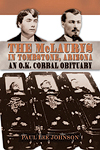 The McLaurys in Tombstone, Arizona: An O.K. Corral Obituary, by Paul Lee Johnson, University of North Texas Press, Denton, 2012, $29.95
The McLaurys in Tombstone, Arizona: An O.K. Corral Obituary, by Paul Lee Johnson, University of North Texas Press, Denton, 2012, $29.95
Brothers Frank and Tom McLaury died at the hands of three Earp brothers and Doc Holliday near the O.K. Corral on October 26, 1881. The McLaurys (and Billy Clanton, who died alongside them) were Cowboys, a term synonymous with outlaws (or at least the black market cattle business) in the region around Tombstone, Arizona Territory. They either got what was coming to them or were victims, depending on which side of the corral fence you are leaning. Author Paul Lee Johnson’s treatment of the pair seems fair. “Tom and Frank were not rootless drifters who committed crimes against people and property,” he writes. “They were two young men from a good family, ambitious and eager to make as big a profit as they could. Yes, they were not above bending the rules.” In other words, they were not so different from many others who came to Tombstone to make money. Neither brother left a diary or letters to provide any insight into their true characters, though Johnson’s research shows that Frank possessed a worse temper and more stubborn willfulness than Tom. What made the brothers stand out is that they both died opposing the Earp faction.
The book also profiles another McLaury in Tombstone, attorney Will McLaury, who arrived in town from Fort Worth, Texas, soon after his younger brothers were gunned down, staying only long enough to settle their affairs and seek redress. The most interesting passages here relate Will’s activities during the Spicer Hearing. Will also wrote several interesting letters from Tombstone, in which he exhibited what Johnson calls a “Hamlet tendency.” He was a lawyer who sought justice and restitution through the law, as well as a big brother who wanted vengeance against his brothers’ “murderers.” In a letter to his sister he wrote, “I shall try to have these men hanged,” meaning Wyatt and Doc and all. In another letter he wrote: “The scoundrels are in Jail and in beds. But…this don’t bring back my dead brothers.” Will did not get the results he wanted in Tombstone, but he seemed to take some satisfaction in the death of Morgan Earp and the crippling of Virgil Earp by Cowboys in the wake of the fight.
Johnson’s solid research provides much information about the brothers’ background (raised in upstate New York and Iowa) and upbringing (father Robert H. was prone to suing and being sued). By the summer of 1876 Will McLaury was living with his own family in Fort Worth. Frank and Tom joined him briefly before going farther west. “A family story,” writes Johnson, “claimed that Frank got into a fight or shooting. According to that story, Will helped to keep Frank out of jail, persuading him to leave town.” But, of course, it would take a bigger fight in another town to make us care about them.
Editor




